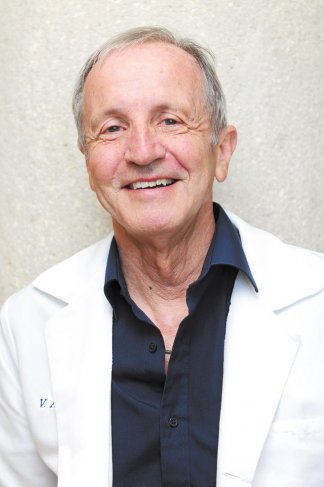Staying Healthy While Traveling
Dr. Vernon Ansdell
Chief of internal medicine at Kaiser Permanente Hawaii
Where did you receive your schooling and training?
I was born and raised in England, where I attended University of Birmingham Medical School. Prior to coming to Hawaii, I sub-specialized in tropical medicine and worked at London School of Hygiene and Tropical Medicine and the Hospital for Tropical Diseases in London for six years.
How long have you been in practice?
I’ve been practicing for more than 40 years. I am currently chief of internal medicine at Kaiser and am also a travel and tropical medicine physician.
What attracted you to the field of travel and tropical medicine?
What really drew me to tropical and travel medicine was the opportunity to study fascinating and exotic diseases such as malaria, rabies and dengue fever. I also liked that with this opportunity came the chance to travel and live in developing countries in various parts of the world. I really enjoy practicing internal medicine, but I must admit that my true passion is travel and tropical medicine.
When making travel plans, what precautions should a person take to stay healthy during their trip?
Do some research to see if you are heading to an area with health advisories. For instance, if you’re traveling to a tropical climate, be aware of mosquito-borne illnesses including malaria, yellow fever, dengue fever and chikungunya; and pack an effective insect repellant such as medicines with controlled-release DEET or picaridin 20 percent in the ingredients. If necessary, take preventive medications such as malaria pills.
Also, know that certain diseases, such as hepatitis A, hepatitis B, rabies and yellow fever, are rare or absent in the U.S. but can be common in developing countries. Check with your doctor to update routine vaccinations such as tetanus, diphtheria, whooping cough, polio, MMR (measles, mumps, rubella), chicken pox and pneumonia. Also be sure to get any recommended or required vaccines.
What are some tips for remaining safe and in good health while traveling?
Plan ahead. Carry a simple medical kit with the basics: adhesive bandages, pain relievers (ibuprofen or acetaminophen), a cold remedy, anti-diarrheal medicine and antibiotic ointment for small cuts and abrasions. You’ll be prepared to self-treat minor health issues and won’t have to worry about where to find these supplies when you need them. Along those lines, if you take prescription medication for a chronic condition, pack it in your carry-on in its original container and make sure you have a full supply. You won’t be affected if your luggage is lost or your flight gets delayed. Keep a list of your prescription medications so that if you do need medical attention, this vital information is at hand for doctors treating you.
If you are traveling abroad, particularly to developing countries, do not drink the local tap water. Safe drinks include hot beverages that use boiled water, such as coffee or tea, and drinks that have been commercially prepared and bottled, such as water, carbonated drinks, fruit juice, alcoholic beverages (in moderation) and pasteurized drinks. Avoid ice cubes made with local tap water, and use bottled water when brushing your teeth.
It’s also very important to eat foods that are well-cooked and still hot when served. Avoid raw foods such as salads and unpeeled fruits, and while tempting, do not dine at street vendors or restaurants with questionable cleanliness.
With health advisories, are there particular locations people should avoid or special precautions that should be taken for all travel?
Check the Centers for Disease Control website, which posts the latest health advisories. You also may want to visit the U.S. Embassies and Consulates website to check for any security advisories or warnings about traveling to a particular destination.
With avian flu in Asia and the Middle East, avoid markets where there are live chickens or other poultry, and eat only well-cooked poultry and eggs. MERS may be linked to camels, so travelers going to affected countries are advised to avoid close contact with camels and avoid consumption of camel products such as unpasteurized milk, undercooked meat and yes, urine, which is actually used as a therapeutic beverage in some parts of the Middle East!
General hygiene measures are always a safe bet. Wash your hands frequently with soap and water, or carry around a hand sanitizer containing at least 60 percent alcohol. Practice common sense and listen to your body, making sure it’s well-hydrated, well-rested and protected from the elements.
Can you talk about your work consulting Polynesian Voyaging Society with medical care and needs?
Over my career I’ve worked as a ships doctor, sailing from England to South Africa, and as the film unit physician in Egypt on the Agatha Christie movie, Death on the Nile. One of my most memorable experiences, however, was being able to sail on the Hokulea in 2007 as medical officer. I am privileged to have been a part of that trip from Yap to Palau and, as part of the medical team advising the current crews on the World Wide Voyage, I am honored to play a role in supporting their preparation and ongoing medical needs.
Anything else you’d like to mention?
Medical considerations are definitely important to staying safe and healthy while traveling, but there are also other tips people should know. For example, to reduce the chances of a motor vehicle accident, avoid motorcycles, overcrowded buses and traveling by road after dark. It’s important to protect yourself from the sun by wearing sunscreen (SPF 30), sunglasses and a hat. And I would be remiss if I didn’t mention that it’s always advisable to practice safe sex. I previously emphasized this, but I think it bears repeating: Use common sense at all times. This simple reminder will help you to have a positive, fun and safe experience.






